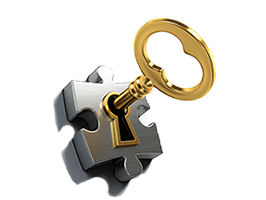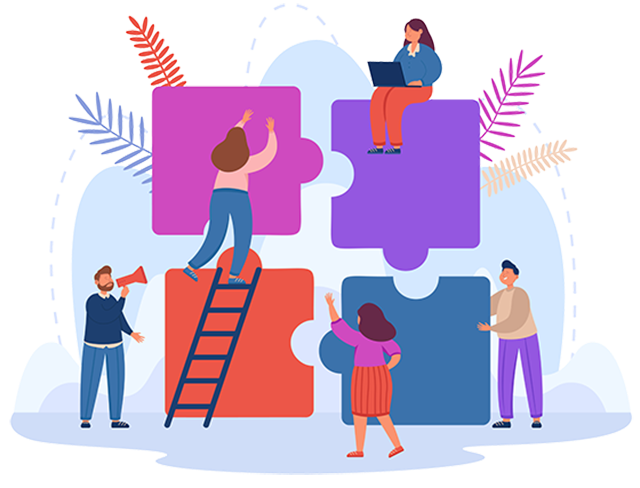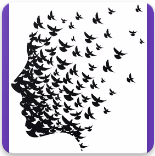Fear of fear
Here you find background information, a fear test and an effective approach to treating the fear of fear.

7 minutes reading time.
Here we want to give you the opportunity to treat the fear of fear. Yes, not to work with or deal with the symptoms, but to thoroughly resolve the causes, i.e. the fear itself. We do this without confrontation (exposure). This means that you are not placed in a confrontational situation and do not need to worry that the fear of the fear could be triggered/activated. Therefore, this can also be done comfortably on your own. We also don’t go back to the past, we just stay in the here and now.
The fear of fear test
Before we start, we offer you a free fear of fear test here. You can use it to check whether you actually have the fear of fear inside you.
Overcoming fear of fear
Any specific fear can be resolved. To do this, we use our Fear Therapy App. This treats fears and also repressed fears with the associated cognitions (beliefs, schemas) in one session.
How do we start now?
You will find the fear test in the blue circle at the bottom right of the screen. If you click on it, it will open and you can start immediately. Free of charge, without advertising and without registration!
You start by entering “fear of fear” in the fear test. It will then check whether you actually have this fear inside you. If you find what you are looking for, you can resolve your fear of fear with our Fear Therapy app. The app’s methods work without confrontation(!) and without traveling into the past.
Fear of fear definition
No human being is free of fear. Fear protects people from the dangers of life. In some people, however, it takes on an exaggerated degree of frequency of occurrence, duration or severity, or anxiety arises without a real threat. In most cases, there is also insufficient ability to alleviate or resolve the anxiety using their own coping strategies. In such cases, we are dealing with an anxiety disorder.
If you suffer from anxiety or a panic disorder, this usually manifests itself through physical symptoms. Anxiety can manifest itself in very different ways. For example, some people sweat more, complain of a racing heart and others may feel dizzy more quickly and have the feeling of losing control of their body. The consequences can range all the way to fear of death.
Due to these unpleasant symptoms and the associated stressful thoughts and feelings, many sufferers are afraid of having another panic attack. They anticipate them with negative feelings and enormous tension. The anticipatory fear of getting into such a threatening situation again is referred toas “fear of fear”.
Fear of fear
Every fear varies in intensity. If the fear of anxiety is very strong, it can lead to panic. A constant state of tension for fear of another panic attack means that those affected focus a great deal of their attention on what is happening in their body. Typical physical reactions are an irregular heartbeat, chest pain, feeling light-headed, nausea, nausea, stomach pains, trembling, sleep disturbances, numbness or tingling sensations in different parts of the body, sweating, dry mouth, rapid breathing, feelings of suffocation or anxiety. Muscle tension becomes muscle tension. Concentration problems, mental blocks or slight irritability often play a role.
If sufferers have observed some of these symptoms before and have been in such a state of anxiety, they may fear that these reactions are signs of a new attack. This results in anxious thoughts, which further intensify the anxious feelings. Even small physical reactions can be perceived as a threat. You quickly slip into a vicious circle of anxiety. Due to the conviction that they are suffering from a serious illness, those affected observe their body more closely, which increases their fear of anxiety, which in turn leads to even more symptoms, thoughts of catastrophe arise and the assumption that they are seriously ill is confirmed from the sufferer’s point of view. Due to the inability to relax and recover after stressful situations, those affected quickly feel tired, exhausted and powerless. Little or no regeneration can take place.
Panic attacks can occur monthly or even several times a day. A single anxiety attack can last up to half an hour. In most cases, one small thing is enough for the psychological stress to lead to a strong anxiety reaction. If an anxiety disorder remains untreated, it can take on a life of its own. Emotions such as the fear oflosing control or of going mad can restrict the sufferer’s life to a great extent. Many sufferers begin to develop avoidance behavior over time. For example, they avoid certain people, avoid being in certain places or getting into situations that can lead to another anxiety attack. Avoidance often results in social isolation, family or partnership conflicts or a career decline, as those affected withdraw further and further and try to protect themselves from “the environment”. Although such behavioral patterns can provide short-term relief, they result in a significant reduction in quality of life. Things that are actually beneficial to health, such as sport, conversations and activities, can no longer be used as a coping strategy.
In addition to the physical symptoms, a lack of confidence in oneself and one’s own abilities have an accompanying and exacerbating effect. Those affected simply feel at the mercy of their fear of fear. Feeling cramped, helpless or even powerless leads to despair, but also to devaluing oneself as “strange” in comparison with other people. Many sufferers turn to their doctor or a clinic excessively often because they consider their symptoms to be life-threatening. At the same time, victims of anxiety disorders fear being seen as “malingerers”, as they are unable to provide a comprehensible real trigger or organic background for their symptoms. There is also the threat of a new vicious circle. So-called “doctor shopping” places a new burden on everyone involved.
Attempts are often made to alleviate symptoms with the help of stimulants such as caffeine, alcohol and nicotine or the consumption of painkillers, sedatives, sleeping pills or illegal drugs. However, this quickly leads to a downward spiral, sometimes into addiction. There is also a risk that those affected will try less and less to overcometheir fear of anxietyusing their own strength due to the usual “chemical support”.
If the cause is not treated and the person lives in constant fear, they often develop depression and become paralyzed, making it increasingly difficult for them to accept professional help.
Those affected are often ashamed to talk about it and are unable to classify the symptoms due to a lack of knowledge. In some cases, this leads to suicidal thoughts and a risk of suicide.
“Thinking will not overcome fear, but acting will.”

Fear Therapy
Effective fear treatment in an app!
Effective content and techniques for treating fears/anxiety.
Thoroughly dissolve any fear, including the associated negative cognition/belief!
No direct confrontation (exposure) with the fear!
Also deals with individual cognitions and all other emotions such as shame, sadness, hate, anger, etc.
Buy the "Fear Therapy" app now for just 19.99 Euros!
Available in the Apple™ App Store or in the Google™ Playstore.


For all questions ...
... please do not hesitate to contact us. Whether it's a question of understanding, product details or questions about treatment.
We are happy to help!

“The highest happiness of man is liberation from fear.”
Walther Rathenau, (1867 - 1922), Politician, writer, industrialist 1922



